Top 5 AI Agents Startups to Watch in 2025: Redefining Automation and Intelligence

Top 5 AI Agents Startups to Watch in 2025: Redefining Automation and Intelligence
The AI Agents Revolution
AI agents—autonomous systems powered by advanced large language models (LLMs) and real-time reasoning—are redefining how industries operate in 2025. Unlike traditional AI, agents execute complex tasks like scheduling, data synthesis, or creative production with minimal human oversight. The global AI agents market, valued at $5.2 billion in 2024, is projected to reach $216.9 billion by 2035, growing at a 40.1% CAGR (Roots Analysis). With $1.9 billion in venture capital flowing into AI agent startups in 2024 (Crunchbase), 51% of tech firms have deployed agents in production (LangChain, 2024). Challenges include performance consistency (45.8% of small firms’ top concern) and compliance with emerging regulations, but these five startups are pioneering reliable, scalable solutions.
1. xAI
Conversational Agents with DeepSearch
xAI develops AI agents like Grok, launched in February 2024, which excel in human-like conversation and task execution. Grok’s DeepSearch feature, equivalent to “100 hours of Google time,” answers complex queries in seconds, leveraging a 100,000-GPU Colossus cluster for unmatched scalability (xAI, 2025). Raising $1.5 billion in Q1 2025 at a $25 billion valuation, xAI serves 2 million users, with integrations in X’s customer support (90% query resolution in under 10 seconds). Its closed-source model ensures performance but raises transparency concerns, especially under EU AI Act scrutiny. xAI’s agents are used in healthcare, retail, and research, reducing operational costs by 40%.
Case Study: A healthcare provider automated patient inquiries with Grok, cutting response times by 35% and saving $2 million annually (2024).
Competitive Edge: xAI’s real-time data integration via X outperforms chatbots like ChatGPT in dynamic environments.
Why It Matters: xAI’s scalability makes it a cornerstone for enterprise automation.
Takeaway: Build a conversational agent with xAI’s API (free tier) and share results on X with #AIAgents2025.
2. Adept
Enterprise Workflow Automation
Adept creates AI agents for automating complex enterprise workflows, such as CRM updates, financial forecasting, and supply chain optimization. Its Nova Act platform, evolved from ACT-1, learns from user interactions, boosting efficiency by 30% (McKinsey, 2025). Despite a 2023 staff loss to Amazon, Adept raised $400 million in 2025 at a $2.2 billion valuation, serving clients like Salesforce (20% faster sales cycles) and IBM. Integrating with 30+ enterprise tools, Adept faces challenges in maintaining accuracy across diverse tasks, addressing this with continuous learning algorithms.
Case Study: A logistics firm automated 15% of supply chain tasks with Adept, saving $1.5 million in 2024 (BytesWall interviews).
Competitive Edge: Adept’s multi-tool integration outshines single-platform solutions like Microsoft Copilot.
Why It Matters: Adept tackles a $1 trillion productivity gap (Deloitte) with scalable solutions.
Takeaway: Test Adept’s workflow automation demo and join their LinkedIn community for best practices.
3. LangChain
Developer-Centric Agent Frameworks
LangChain provides modular frameworks like LangChain and LangGraph for building custom AI agents, powering 12,000+ decentralized apps (dApps) in analytics, chatbots, and compliance. With 50,000+ GitHub stars, it raised $25 million in 2025 at a $1.6 billion valuation. LangChain’s Agentica framework integrates with Google’s A2A Protocol for interoperability, but scaling complex workflows is limited by LLM unpredictability (LangChain, 2024). Its open-source model fosters a developer community, with 51% of tech firms using multiple control methods for reliability.
Case Study: A fintech app automated compliance checks with LangChain, cutting costs by 25% ($3 million in 2024).
Competitive Edge: Open-source accessibility contrasts with OpenAI’s closed SDK, driving developer adoption.
Why It Matters: LangChain fuels a $500 billion developer market (Statista) by democratizing agent creation.
Takeaway: Build an agent using LangChain’s GitHub tutorials and share on r/MachineLearning.
4. Imbue
Reasoning Agents for Science
Imbue focuses on AI agents with advanced reasoning for scientific and financial applications. Powered by proprietary LLMs, its agents solve complex problems 3x faster than general models in drug discovery and risk analysis (Nature, 2024). Raising $200 million in 2025 at a $1.2 billion valuation, Imbue serves clients like Pfizer, accelerating R&D cycles by 20%. Its explainable AI (XAI) approach addresses transparency mandates, though high compute costs pose scalability challenges. NVIDIA’s backing enhances its compute infrastructure.
Case Study: A pharma firm identified 5 new compounds with Imbue’s agents, saving $10 million in trials (2024).
Competitive Edge: XAI focus aligns with regulatory demands, unlike less transparent competitors.
Why It Matters: Imbue unlocks breakthroughs in high-stakes fields like healthcare and finance.
Takeaway: Explore Imbue’s XAI whitepapers on Imbue.com and join their AI ethics forums.
5. Runway AI
Creative Automation Agents
Runway AI develops AI agents for creative industries, automating video editing, 3D modeling, and graphic design. Its Gen-3 platform supports 1.5 million creators, cutting production time by 60% (VentureBeat). Raising $500 million in 2025 at a $3 billion valuation, Runway serves studios like Universal, generating 4K content in minutes. Ethical concerns over AI-generated content authenticity persist, but Runway’s user-friendly tools drive adoption. Its API supports 500,000+ monthly active projects.
Case Study: A marketing agency produced 50 ads with Runway, saving $500,000 in 2024 (BytesWall).
Competitive Edge: Runway’s creative focus differentiates it from general-purpose platforms like Midjourney.
Why It Matters: Runway taps a $100 billion creative tech market, empowering creators.
Takeaway: Use Runway’s free trial for a video project and share with #AIAgents2025.
AI Agents: Opportunities and Challenges
AI agents are poised to transform industries, with 85% of Fortune 500 firms adopting them by 2026 (Gartner). These startups target a $3 trillion automation market by 2030 (McKinsey), but face challenges: – Performance Quality: 45.8% of small firms cite inconsistent outputs as a top issue (LangChain, 2024). – Ethics & Regulation: The EU AI Act (2025) mandates transparency, pushing XAI adoption (e.g., Imbue’s focus). – Competition: Big Tech (Microsoft’s Copilot, Google’s A2A) competes, but startups’ niche expertise (e.g., Runway’s creativity) gives an edge. With $1.9 billion raised in 2025, backed by Sequoia and Andreessen Horowitz, these startups prioritize scalability, ethics, and integration.
Trends for 2025–2027:
- Interoperability: 65% of agents will use protocols like A2A (Google, 2025).
- Edge Deployment: 25% of tasks will shift to edge devices (IDC).
- Ethical AI: XAI will grow 30% to meet regulatory demands.
Navigating Regulatory Challenges
AI agents face stringent regulations, including the EU AI Act (2026 compliance) and proposed NIST AI standards (2025), requiring transparency and bias audits. Non-compliance risks fines up to $35 million (EU). Startups like Imbue use XAI to explain decisions, while xAI’s closed models face scrutiny. Enterprises should:
- Adopt auditing tools (e.g., LangChain’s Agentica).
- Train teams on ethical AI via Coursera’s AI Ethics (~12 hours).
- Partner with compliant providers like Adept.
60-Day Roadmap to Master AI Agents
Dive into AI agents with this roadmap:
- Days 1–15: Learn basics with Coursera’s “AI Agents 101” (free audit, ~10 hours).
- Days 16–30: Build a chatbot using LangChain’s tutorials or xAI’s API; test Adept’s tools.
- Days 31–45: Engage in r/MachineLearning and LinkedIn AI groups to discuss trends.
- Days 46–60: Develop a portfolio project (e.g., creative agent with Runway) and share on GitHub/LinkedIn with #AIAgents2025.
Pro Tip: Attend NeurIPS 2025 (~$150) for networking.
Join the AI agents revolution! Follow these startups and explore tech trends at BytesWall.com.

